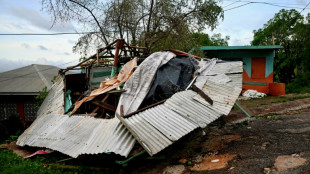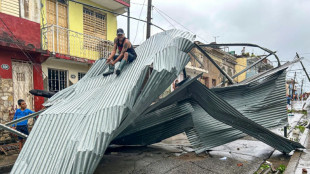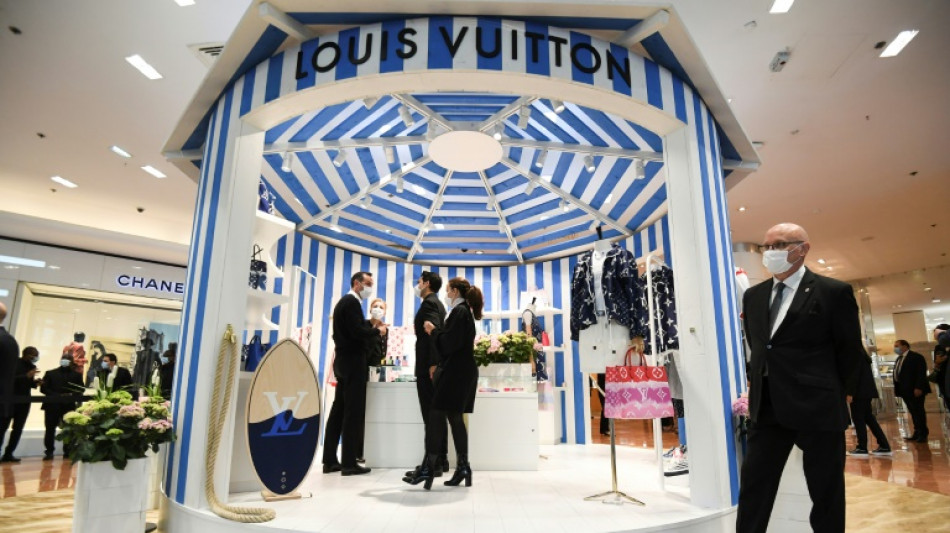
-
 Yesavage fairytale carries Blue Jays to World Series brink
Yesavage fairytale carries Blue Jays to World Series brink
-
Bank of Japan keeps interest rates unchanged

-
 Impoverished Filipinos forge a life among the tombstones
Impoverished Filipinos forge a life among the tombstones
-
Jokic posts fourth straight triple-double as Nuggets rout Pelicans

-
 UN calls for end to Sudan siege after mass hospital killings
UN calls for end to Sudan siege after mass hospital killings
-
Teenage Australian cricketer dies after being hit by ball

-
 As Russia advances on Kupiansk, Ukrainians fear second occupation
As Russia advances on Kupiansk, Ukrainians fear second occupation
-
Trade truce in balance as Trump meets 'tough negotiator' Xi

-
 China to send youngest astronaut, mice on space mission this week
China to send youngest astronaut, mice on space mission this week
-
Yesavage gem carries Blue Jays to brink of World Series as Dodgers downed

-
 With inflation under control, ECB to hold rates steady again
With inflation under control, ECB to hold rates steady again
-
Asia stocks muted with all eyes on Trump-Xi meeting

-
 Personal tipping points: Four people share their climate journeys
Personal tipping points: Four people share their climate journeys
-
Moto3 rider Dettwiler 'no longer critical' after crash: family

-
 US economy in the dark as government shutdown cuts off crucial data
US economy in the dark as government shutdown cuts off crucial data
-
Trump orders nuclear testing resumption ahead of Xi talks

-
 'Utter madness': NZ farmers agree dairy sale to French group
'Utter madness': NZ farmers agree dairy sale to French group
-
Samsung posts 32% profit rise on-year in third quarter

-
 30 years after cliffhanger vote, Quebec separatists voice hope for independence
30 years after cliffhanger vote, Quebec separatists voice hope for independence
-
Taxes, labor laws, pensions: what Milei wants to do next

-
 South Sudan's blind football team dreams of Paralympic glory
South Sudan's blind football team dreams of Paralympic glory
-
US says 4 killed in new strike on alleged Pacific drug boat

-
 What we do and don't know about Rio's deadly police raid
What we do and don't know about Rio's deadly police raid
-
'They slit my son's throat' says mother of teen killed in Rio police raid

-
 Arteta hails 'special' Dowman after 15-year-old makes historic Arsenal start
Arteta hails 'special' Dowman after 15-year-old makes historic Arsenal start
-
Google parent Alphabet posts first $100 bn quarter as AI fuels growth

-
 Underwater 'human habitat' aims to allow researchers to make weeklong dives
Underwater 'human habitat' aims to allow researchers to make weeklong dives
-
Maresca slams Delap for 'stupid' red card in Chelsea win at Wolves

-
 'Non-interventionist' Trump flexes muscles in Latin America
'Non-interventionist' Trump flexes muscles in Latin America
-
Slot defends League Cup selection despite not meeting 'Liverpool standards'

-
 'Poor' PSG retain Ligue 1 lead despite stalemate and Doue injury
'Poor' PSG retain Ligue 1 lead despite stalemate and Doue injury
-
Liverpool crisis mounts after League Cup exit against Palace

-
 Kane scores twice as Bayern set European wins record
Kane scores twice as Bayern set European wins record
-
Radio Free Asia suspends operations after Trump cuts and shutdown

-
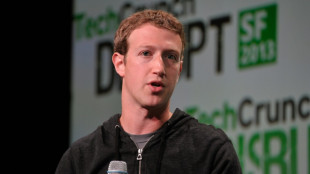 Meta shares sink as $16 bn US tax charge tanks profit
Meta shares sink as $16 bn US tax charge tanks profit
-
Dollar rises after Fed chair says December rate cut not a given

-
 Google parent Alphabet posts first $100 bn quarter as AI drives growth
Google parent Alphabet posts first $100 bn quarter as AI drives growth
-
Rob Jetten: ex-athlete setting the pace in Dutch politics

-
 Juve bounce back after Tudor sacking as Roma keep pace with leaders Napoli
Juve bounce back after Tudor sacking as Roma keep pace with leaders Napoli
-
Favorite Sovereignty scratched from Breeders' Cup Classic after fever

-
 Doue injured as PSG held at Lorient in Ligue 1
Doue injured as PSG held at Lorient in Ligue 1
-
Leverkusen win late in German Cup, Stuttgart progress

-
 Jihadist fuel blockade makes life a struggle in Mali's capital
Jihadist fuel blockade makes life a struggle in Mali's capital
-
Uber plans San Francisco robotaxis in Waymo challenge
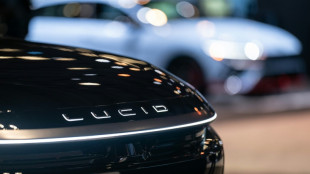
-
 Paramilitary chief vows united Sudan as his forces are accused of mass killings
Paramilitary chief vows united Sudan as his forces are accused of mass killings
-
Trump, Xi to meet seeking truce in damaging trade war

-
 Divided US Fed backs second quarter-point rate cut of 2025
Divided US Fed backs second quarter-point rate cut of 2025
-
'Amazing' feeling for Rees-Zammit on Wales return after NFL adventure

-
 'Cruel' police raids help, not hinder, Rio's criminal gangs: expert
'Cruel' police raids help, not hinder, Rio's criminal gangs: expert
-
S. African president eyes better US tariff deal 'soon'


French luxury houses give unsold goods a second chance
In the extravagant world of the French luxury industry, brands used to prefer destroying their unsold goods rather than offering their high-priced products at a discount.
But gone are the days of binning the coats, handbags and shoes pooh-poohed by shoppers after a new anti-waste law came into force at the start of the year.
Now luxury houses are managing their stocks more carefully, offering deals to staff, making donations and recycling goods.
"It's a subject that has become important today," said Julie El Ghouzzi, a luxury goods expert at the Cultz consulting agency.
She pointed to the scandal that engulfed Burberry in 2018 after the British luxury brand disclosed that it had destroyed 28 million pounds ($38 million, 34 million euros at current exchange rates) of unsold goods in 2017 -- the equivalent of 20,000 of its trench coats.
Following the firestorm the revelation triggered, Burberry announced it would halt the practice from the following year.
Markdowns to move goods are not an option in the luxury business as lower prices can undermine the attractiveness of their labels, which thrive on their elite status.
"In the luxury sector, if the price tag is lower, so is the desire to buy it," said El Ghouzzi.
- Mentalities have changed -
Luxury houses are paying more attention to the subject now, said Arnaud Cadart, a portfolio manager at Paris-based asset manager Flornoy.
"Mentalities have changed, we're no longer in an economy that values unbridled creation above all else," he said.
Also gone is the mentality that "if it doesn't work we'll destroy it," said Cadart.
Now luxury houses strive to fine-tune their stocks.
The Kering group, which owns the Gucci, Saint Laurent, and Balenciaga labels among others, has invested in artificial intelligence in order to better manage its stock.
At its competitor LVMH, the world's largest luxury group that includes Louis Vuitton, Dior, and Celine among many others, environmental development director Helene Valade said "the luxury business model is closely adjusted to demand" with low levels of stock being held by the firms.
Nevertheless, she acknowledged that the new law will push luxury houses to learn even more about their clients to better anticipate their purchases and thus reduce stocks to a minimum.
El Ghouzzi said Louis Vuitton is already quite good at keeping track of its stock.
"They know exactly what they have in stock and are capable of managing it down to the millimeter," she said, adding "that's not the case in many other houses."
When there are nevertheless unsold goods, selling them to staff at advantageous prices is one option. These large fashion groups have large staffs, with more than 150,000 employees at LVMH, 38,000 at Kering and 16,600 at Hermes.
Gifts to associations is another option.
LVMH has a partnership with Cravate Solidaire, an association that collects donations of professional clothing and provides it to people with disadvantaged backgrounds trying to land jobs.
- Upcycling -
Designers have also begun to make use of discarded or leftover materials, a practice often called upcycling.
"Previously, a designer with a brilliant idea would go search for materials to realise their idea," LVMH's Valade told AFP.
"Today, the process is sometimes the reverse: there are certain designers who start with the materials at hand -- old collections, unused fabric hanging about, leftover bits of leather... and it inspires them," she said.
This was the case for late American designer Virgil Abloh, who was the artistic director of Louis Vuitton's menswear collection from 2018 until his death in 2021.
Marc Jacobs in New York works with Fabscrap, which recycles unused fabric to create insulation or products like furniture lining, or donates it to students and artists to use for their creations.
LVMH also has a partnership with WeTurn, which collects unsold clothing and material to recycle it into new thread and fabric.
Hermes said that in 2020 it sold 39,000 upcycled products.
"The activities which destroy the most are fashion, leather goods and cosmetics," said portfolio manager Cadart.
Given the efforts undertaken and the current economic conditions, items are more often out of stock than lying about unsold.
"Since 2014, Hermes has thrown out almost nothing, everything flies off the shelves," Cadart added.
At LVMH, Valade said, "leather goods are, at the moment, in more of a situation of being out of stock" than not being sold.
She pointed to an upcycled Loewe bag made from scrap leather cuttings that sells for 1,700 euros and which is currently out of stock.
O.Krause--BTB

